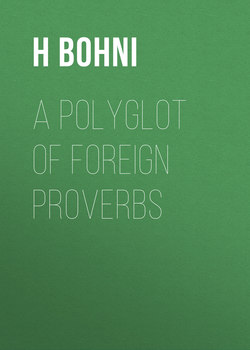Читать книгу A Polyglot of Foreign Proverbs - H Bohni - Страница 20
FRENCH PROVERBS
T
ОглавлениеTant doit-on le chien blandir qu’on ait la voie passée. One must talk soothingly to the dog until one has passed him.
Tant va la cruche à l’eau qu’à la fin elle se brise. The pitcher goes often to the well and gets broken at last.
Tant vaut l’homme, tant vaut sa terre. As the man is worth his land is worth.
Tard donner, c’est refuser. To give tardily is to refuse.
Tel a beaux yeux qui n’y voit goutte. Some have fine eyes and can’t see a jot.
Tel a du pain qui n’a plus de dents. Some have bread who have no teeth left.
Tel croit se chauffer qui se brûle. Some who mean only to warm, burn themselves.
Tel cuide avoir fait qui commence. Some think they have done when they are only beginning.
Tel cuide venger sa honte qui l’accroît. Some thinking to avenge their shame increase it.
Tel en pâtit qui n’en peut mais. Many a one suffers for what he can’t help.
Tel maître, tel valet. Like master, like man.
Tel menace, qui a peur. A man may threaten yet be afraid.
Tel menace, qui est battu. The threatener sometimes gets a beating.
Tel qui rit vendredi, dimanche pleurera. He that laughs on Friday may cry on Sunday.
Tel vend, qui ne livre pas. Some sell and don’t deliver.
Temps, vent, femme, et fortune, changent comme la lune. Weather, wind, women, and fortune change like the moon.
Tendresse maternelle toujours se renouvelle. Mother’s love is ever in its spring.
Tenir le loup par les oreilles. To hold the wolf by the ears.
Tête de fou ne blanchit jamais. A fool’s head never whitens.
Tirer le diable par la queue, ne mène loin jeunes ni vieux. Pulling the devil by the tail does not lead far young or old.
Tirer les marrons du feu avec la patte du chat. To take the chesnuts out of the fire with the cat’s paw.
Tôt gagné, tôt gaspillé. Soon gained soon squandered.
Toujours amoureux, jamais marié. Always in love, never married.
Toujours ne frappe-t-on pas ce à quoy l’on vise. One does not always hit what one aims at.
Toujours pêche qui en prend un. He fishes on who catches one.
Toujours truye songe bran. A sow is always dreaming of bran.
Tout bec crochu de proye est soustenu. Every hooked beak is maintained by prey.
Tout bois n’est pas bon à faire flèche. Not every sort of wood is fit to make an arrow.
Tout ce qui branle ne tombe pas. Every thing does not fall that totters.
Tout ce qui reluit n’est pas or. All is not gold that glitters.
Tout chemin mène à Rome. Every road leads to Rome.
Toute chair n’est pas venaison. All flesh is not venison.
Toute chose qui est bonne à prendre est bonne à rendre. What is worth receiving is worth returning.
Toute comparaison est odieuse. Comparisons are odious.
Toute eau éteint feu. Any water puts out fire.
Toutes les clefs ne pendent pas à une ceinture. All the keys don’t hang at one girdle.
Toutes têtes ne sont pas coffres à raison. All heads are not sense-boxes.
Toutes vérités ne sont pas bonnes à dire. All truths are not good to be uttered.
Tout état, et rien au plat. All state, and nothing on the plate.
Tout fait ventre, pourvu qu’il entre. A bellyful is a bellyful.
Tout le monde est sage après l’événement. Everybody is wise after the thing has happened.
Tout paraît jaune à qui a la jaunisse. To the jaundiced all things seem yellow.
Tout passe, tout casse, tout lasse. Everything passes, everything breaks, everything wearies.
Tout va à qui n’a pas besoin. Everything goes to him who does not want it.
Tout vient à point à qui sait attendre. Everything in time comes to him, who knows how to wait.
Tout y va par compère et commère. Everything goes by favour and cousinship.
Tricherie revient à son maître. Trickery comes back to its master.
Triste est la maison où le coq se tait et la poule chante. It is a sorry house in which the cock is silent and the hen crows.
Trois déménagements valent un incendie. Three removals are as bad as a fire.
Trois frères, trois châteaux. Three brothers, three castles.
Trop achète le miel qui le lèche sur les épines. He pays dear for honey who licks it off thorns.
Trop de zèle gâte tout. Too much zeal spoils all.
Trop gratter cuit, trop parler nuit. Too much scratching smarts, too much talking harms.
Trop tard crie l’oiseau quand il est pris. It is too late for the bird to scream when it is caught.
Trop tranchant ne coupe pas, trop pointu ne perce pas. Too keen an edge does not cut, too fine a point does not pierce.
Truie aime mieux bran que roses. A sow prefers bran to roses.
Tuer la poule pour avoir l’”oe]uf. To kill the hen by way of getting the egg.
Tuer un mercier pour un peigne. To kill a mercer for a comb.
